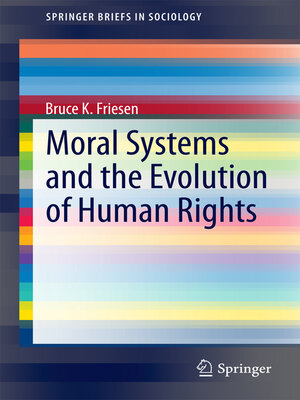Moral Systems and the Evolution of Human Rights
ebook ∣ SpringerBriefs in Sociology
By Bruce K. Friesen

Sign up to save your library
With an OverDrive account, you can save your favorite libraries for at-a-glance information about availability. Find out more about OverDrive accounts.
Find this title in Libby, the library reading app by OverDrive.



Search for a digital library with this title
Title found at these libraries:
| Library Name | Distance |
|---|---|
| Loading... |
This volume offers a comprehensible account of the development and evolution of moral systems. It seeks to answer the following questions: If morals are eternal and unchanging, why have the world's dominant religious moral systems been around for no more than a mere six thousand of the two hundred thousand years of modern human existence? What explains the many and varied moral systems across the globe today? How can we account for the significant change in moral values in one place in less than 100 years' time? Using examples from classical civilizations, the book demonstrates how increasing diversity compromises a moral system's ability to account for and integrate larger populations into a single social unit. This environmental stress is not relieved until a broader, more abstract moral system is adopted by a social system. This new system provides a sense of belonging and purpose for more people, motivating them to engage in prosocial (or moral) acts and refrain from socially disruptive selfish acts. The current human rights paradigm is the world's first universal, indigenous moral system. Because moral systems can be expected to continue to evolve, this book points to current boundaries of the human rights paradigm and where the next major moral revolution might emerge.







